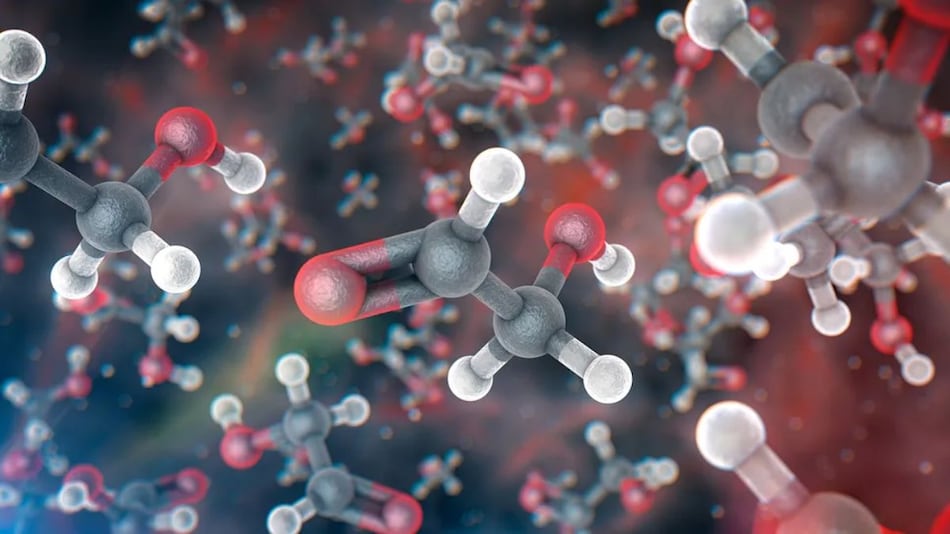- Home
- Science
- Science News
- Saturn’s Icy Moon Enceladus Organic Molecules May Have Been Fromed by Cosmic Rays, Scientists Find
Saturn’s Icy Moon Enceladus Organic Molecules May Have Been Fromed by Cosmic Rays, Scientists Find
New study shows radiation can create organic molecules on Saturn’s moon Enceladus.

Photo Credit: ALMA (ESO/NAOJ/NRAO)/L. Calçada (ESO)
Radiation near Saturn’s moon Enceladus may create organic molecules in its icy plumes
New studies indicate that some organic molecules were not born in the hidden ocean of Saturn's icy moon Enceladus as had been previously hypothesised and instead might be formed when small, relatively simple organic compounds are bombarded by charged particles created by cosmic rays strafing space. That complicates the way scientists interpret the chemical evidence collected by NASA's Cassini spacecraft, which had previously suggested there could be a potentially habitable ocean beneath the moon's icy surface, flush with compounds necessary for life. The new results suggest that radiation may be a more active agent in shaping the moon's chemistry than previously believed.
Lab Experiments Reveal How Space Radiation Can Create Organic Molecules on Icy Moons
According to a report presented at the Europlanet Science Congress–Division for Planetary Sciences Joint Meeting (EPSC-DPS 2025) in Helsinki and published in Planetary and Space Science, a research team led by planetary scientist Grace Richards of the National Institute for Astrophysics in Rome recreated conditions near Enceladus's surface in the lab. They cooled a mix of water, carbon dioxide, methane, and ammonia to about –200°C and bombarded it with water ions, mimicking the radiation that constantly strikes the moon.
Radiation leads to chemical reactions on frozen moons like Enceladus, creating compounds including alcohols, cyanate, ammonium and formamide that could bring about life on the icy worldlets, a new study has found.
Planetary scientists are today decoding the data of new missions, such as JUICE and Europa Clipper, to work out how organic molecules form and evolve in high-radiation settings.
Scientists find complex molecules in Enceladus's plumes from amid radiation (from which some are produced) and deep below the surface, evidence of its status as a compelling world to search for life beyond Earth.
Catch the latest from the Consumer Electronics Show on Gadgets 360, at our CES 2026 hub.
Related Stories
- Samsung Galaxy Unpacked 2025
- ChatGPT
- Redmi Note 14 Pro+
- iPhone 16
- Apple Vision Pro
- Oneplus 12
- OnePlus Nord CE 3 Lite 5G
- iPhone 13
- Xiaomi 14 Pro
- Oppo Find N3
- Tecno Spark Go (2023)
- Realme V30
- Best Phones Under 25000
- Samsung Galaxy S24 Series
- Cryptocurrency
- iQoo 12
- Samsung Galaxy S24 Ultra
- Giottus
- Samsung Galaxy Z Flip 5
- Apple 'Scary Fast'
- Housefull 5
- GoPro Hero 12 Black Review
- Invincible Season 2
- JioGlass
- HD Ready TV
- Laptop Under 50000
- Smartwatch Under 10000
- Latest Mobile Phones
- Compare Phones
- Realme Neo 8
- OPPO Reno 15 FS
- Red Magic 11 Air
- Honor Magic 8 RSR Porsche Design
- Honor Magic 8 Pro Air
- Infinix Note Edge
- Lava Blaze Duo 3
- Tecno Spark Go 3
- Acer Chromebook 311 (2026)
- Acer Chromebook Spin 311
- Lenovo Idea Tab Plus
- Realme Pad 3
- Moto Watch
- Garmin Quatix 8 Pro
- Haier H5E Series
- Acerpure Nitro Z Series 100-inch QLED TV
- Asus ROG Ally
- Nintendo Switch Lite
- Haier 1.6 Ton 5 Star Inverter Split AC (HSU19G-MZAID5BN-INV)
- Haier 1.6 Ton 5 Star Inverter Split AC (HSU19G-MZAIM5BN-INV)







![[Sponsored] Haier C90 OLED TV | Dolby Vision IQ, 144Hz OLED and Google TV in Action](https://www.gadgets360.com/static/mobile/images/spacer.png)









